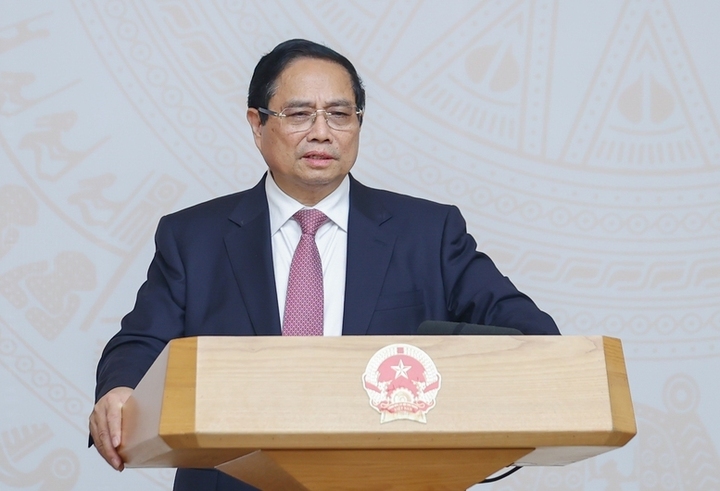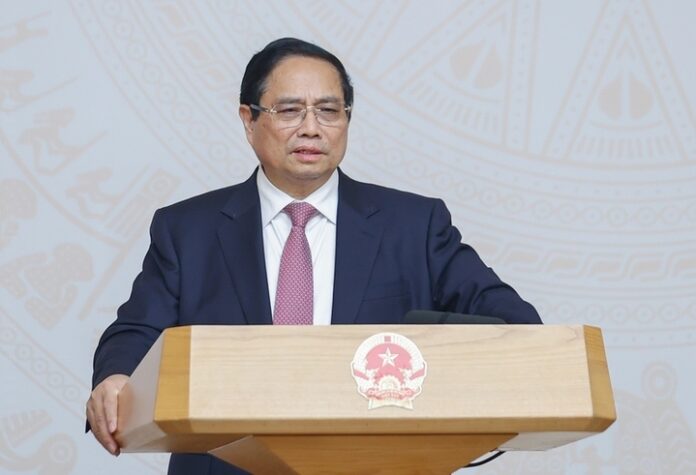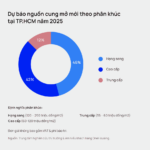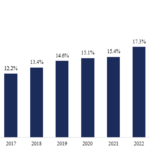According to the Government Newspaper, in the late afternoon of April 7th, Prime Minister Pham Minh Chinh chaired a conference with ministries, sectors, and Vietnamese representative agencies abroad, along with associations and businesses, to proactively adapt to new developments in international trade.
The Prime Minister stated that the new tariff policy implemented by the United States will impact the global economy, including Vietnam. However, the general spirit is to remain calm and resilient, embracing challenges and striving to rise stronger, demonstrating the spirit, core values, wisdom, and culture of the Vietnamese people.
Prime Minister Chinh also emphasized that this is an opportunity to restructure our economy towards rapid and sustainable development, embracing green and digital transformation, and innovation-driven growth. We aim for a resilient and autonomous economy, actively integrating into the global community with substance and effectiveness.

Prime Minister Pham Minh Chinh. (Photo: VGP/Nhat Bac)
The Government and relevant ministries and sectors will continue to focus on three strategic breakthroughs: institutions, infrastructure, and human resources. The goal is to create a conducive environment for businesses with streamlined regulations, efficient infrastructure, and smart human resources and governance.
Regarding institutional reform, the Prime Minister emphasized the need to reduce time and costs for people and businesses. By 2025, we aim to reduce the time for administrative procedures by at least 30%, cut business costs by at least 30%, and eliminate at least 30% of business conditions.
During the upcoming National Assembly session, the Government plans to submit around 35 laws and resolutions, including laws on enterprises, investment, public-private partnerships, bidding, state budget, management and use of state capital, science and technology, and innovation.
Additionally, the Ministry of Finance and the State Bank are directed to prepare support packages for businesses in case of difficulties. The Prime Minister has also instructed the State Bank to develop and implement a preferential credit package of approximately VND 500,000 billion for science, technology, innovation, and strategic infrastructure.
In terms of fiscal policy, the Prime Minister mentioned proposing to competent authorities to continue reducing VAT in 2025 and 2026 and adjusting the personal income tax exemption threshold.
Monetary policy will be managed proactively, flexibly, timely, and effectively, in harmony with an appropriately expanded fiscal policy, focusing on priority areas and growth drivers. This includes facilitating businesses’ access to capital, reducing costs, and lowering lending interest rates. Currency exchange rates will also be managed proactively, flexibly, and effectively.
The Government and ministries will work on planning, negotiating market expansion, ensuring equal access to policies and resources for businesses, protecting intellectual property rights, and combating origin fraud. We will also propose expanding visa-free entry for certain eligible individuals and countries.
Prime Minister Chinh emphasized the importance of valuing time, wisdom, and decisiveness to achieve the growth target of 8% in 2025, setting the stage for sustained double-digit growth towards the centenary goals.
The Art of the Central Bank’s Rate Cut: A Step-by-Step Guide from the Experts
“Mr. Tran Ngoc Bau predicts that the State Bank of Vietnam (SBV) will definitely cut interest rates, with the speed of the cut depending on the movement of foreign capital. This interest rate cut will apply to both the retail market and the interbank market, affecting loans and savings products for individuals and businesses alike.”
The Debt Burden’s Drag on Economic Growth
Debt is a pivotal tool in the modern financial system, stimulating consumption and investment while contributing to economic growth. When managed prudently, credit enables businesses to expand their production, enhance operational efficiency, and improve labor income, thereby creating a positive ripple effect on the economy. However, debt growth is not a panacea for perpetual expansion, as the burden of interest payments can become onerous.
Inflation Management Must Stay Grounded in Reality from the Start
In 2024, the consumer price index (CPI) rose by an average of 3.63% compared to 2023, remaining below the target set by the National Assembly. This marks a decade of Vietnam’s successful inflation control, with an average rate below 4%. Experts suggest that maintaining a CPI increase of around 4.5% in 2025 to support a substantial 8-10% growth will be a challenging task, requiring decisive and meticulous management from governing bodies from the get-go.




















